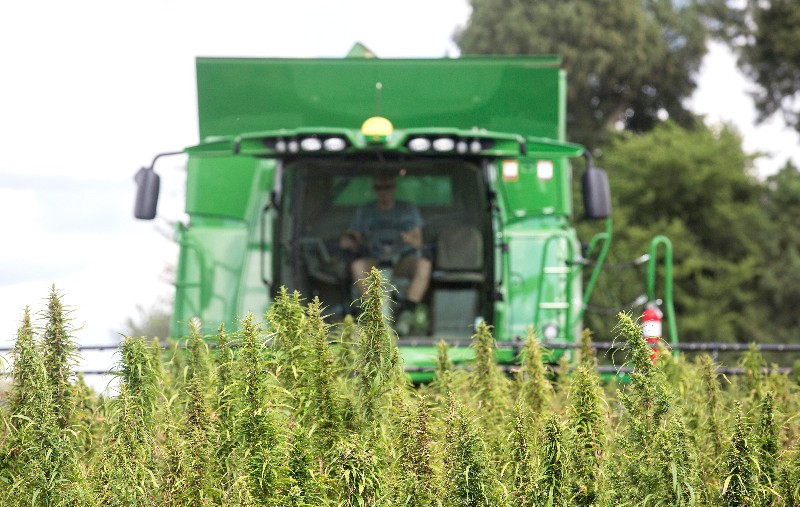By Bruce Schreiner Associated Press
Kentucky’s resurgent hemp sector flexed more economic clout in 2018, with processors reporting sharply higher sales and farmers reaping more than twice as much income from their crop, the state’s agriculture commissioner said Monday.
The state’s hemp processors reported $57.75 million in gross product sales last year, compared with $16.7 million in 2017, Kentucky Agriculture Commissioner Ryan Quarles said. Processors spent $23.4 million in capital improvements and employed a total of 459 people in 2018, he said.
A Look at the Numbers
Processors paid Kentucky farmers $17.75 million for harvested hemp materials in 2018, up from $7.5 million the year before, Quarles said.
The numbers were based on licensed processors’ reports to the Kentucky Department of Agriculture and provided a snapshot of hemp’s growth heading into a new era of full legalization. Even with the growth, hemp remains a blip on the radar for Kentucky’s diversified agriculture sector.
But Quarles said the figures solidify Kentucky’s reputation as a national leader in the crop’s comeback.
“We are building the critical mass of growers, processors and researchers that will ensure the hemp industry’s success in Kentucky for years to come,” he said in a release.
Farm Bill Expands 2019 Outlook
Last year’s surge in processor sales and the amount paid farmers came before hemp was legalized as a farm commodity as part of the new federal farm bill. The measure approved in late 2018 removed hemp from the list of federally controlled substances. It treats the low-THC version of the cannabis plant like any other agricultural crop. THC is the cannabis compound that gives marijuana its high.
Senate Majority Leader Mitch McConnell helped push Congress to legalize hemp. The Kentucky Republican put himself on the conference committee that worked out the deal that legalized hemp. Another Kentuckian who served on the conference committee was U.S. Rep. James Comer, who was an early hemp advocate when he was the state’s agriculture committee.
Hemp Uses: Past to Present
Hemp is deeply rooted in Kentucky’s past. The crop was historically used for rope but has many other uses, including clothing and mulch from the fiber; hemp milk and cooking oil from the seeds; and soap and lotions. Other uses include building materials, animal bedding and biofuels. Hemp-derived cannabidiol, or CBD oil, has become increasingly popular as a health product.
The crop was banned for decades due to its family ties to marijuana. Hemp and marijuana are the same species, but hemp has a negligible amount of the psychoactive compound that gives marijuana users a high.
More Acreage, More Hemp
Quarles also said Monday that more than 50,000 acres (20,234 hectares) have been approved for Kentucky hemp production in 2019, more than triple the approved acreage in 2018. The number of approved hemp grower applicants for 2019 is set to be 1,047, nearly five times higher than in 2018.
Last year, 210 Kentucky farmers planted more than 6,700 acres (2,710 hectares) of hemp. A mere 33 acres (13 hectares) were planted in 2014, the first year the crop was allowed to be grown on an experimental basis.
The crop was banned for decades, but hemp’s comeback started with the 2014 farm bill, when McConnell helped push for a provision allowing states to pursue hemp research and development.
Kentucky’s agriculture department has approved 110 hemp processor/handler license applications so far for 2019 and expects more applications, Quarles said. It also has approved more than 6 million square feet of greenhouse space for hemp cultivation, he said.
Hurdles Remain Despite Gains
Quarles cautioned that the hemp sector is in the “beginning stages” of its transition to full commercialization and urged growers and processors to be “clear-eyed” about the opportunities and challenges.
“Like all crops and business ventures, there is risk in this industry,” he said.
The new farm bill gives hemp growers increased access to USDA programs. Quarles said federal crop insurance and other USDA programs will take time to develop as the Trump administration works to implement all aspects of the farm bill.
The farm bill gave state agriculture departments primary authority for hemp’s oversight. It set minimum regulatory requirements that states must meet to win USDA approval. Quarles submitted Kentucky’s plan to the U.S. agriculture secretary on the same day President Donald Trump signed the farm bill last December. USDA has said it plans to finalize regulations and approve state plans in time for the 2020 growing season.







